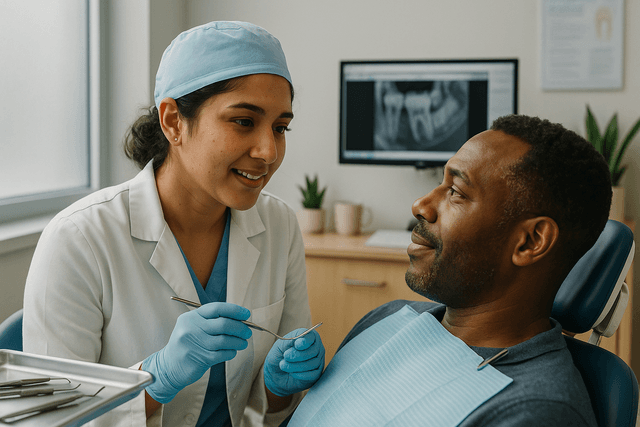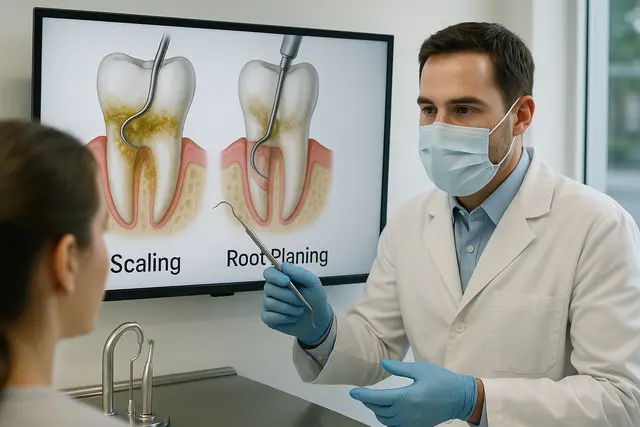General Dentistry
5 min read
Sep 05, 2025
What's a Dental Exam and Why Is It Important?
Regular dental exams might not be the most exciting part of your schedule, but they play a vital role in keeping your teeth and overall health in check. Understanding what happens during a dental exam, and why it matters can help you stay proactive about your oral care.

Going to the dentist isn’t exactly topping anyone’s weekend plans. But if you’ve ever wondered what a dental exam actually is (besides a moment to reevaluate your flossing habits), and why it really matters, this one’s for you. Whether it’s your first dental visit or your hundredth check-up, understanding the importance of regular dental care can make all the difference in your oral and general health.
What Happens During a Dental Exam?
So, what actually happens during a dental exam? Picture this: you’re in the exam room, reclining back in that oddly comfortable chair, and you’re greeted by your friendly dental hygienist. They’re usually the first to peek inside your mouth, checking your teeth and gums and starting with a cleaning that scrapes away built-up plaque along your gum line. That’s the stuff that causes cavities, bad breath, and eventually gum disease if it overstays its welcome.
Your cleaning may include polishing to clean your teeth and a quick lesson on how to brush and floss like a pro. After that, the dentist steps in to do a more thorough oral exam. They’ll check for tooth decay, examine your gum health, and possibly look for signs of oral cancer or other oral health problems. Depending on your current oral health or if it’s your first dental visit, the dentist may also recommend dental x-rays to check for bone loss or decay hiding below the surface.
Do You Need a Dental Exam? Spoiler: You Probably Do
If you're wondering whether you need a dental exam, the answer is probably yes. Even if you’re not in pain or don’t see anything weird going on in your mouth, dental problems can brew silently. A routine dental exam every six months helps prevent small issues from turning into big, expensive ones. Think of it as routine maintenance for your teeth and mouth, like changing the oil in your car, except with a much better-smelling office.
And if you’ve got dental insurance, like a plan through Delta Dental, regular dental exams are often fully covered. That's preventive dental care at its finest. Use it. You’ve earned it.
The Difference Between a Dental Exam and a Cleaning
Here’s where a lot of folks get confused: the difference between a dental cleaning and an exam. A dental cleaning (usually done by the dental hygienist) focuses on removing plaque, tartar, and stains from your teeth. It’s all about prevention, getting your teeth squeaky clean and keeping your gums healthy.
A dental exam, on the other hand, is a detailed inspection by your dentist. They’re looking for signs of trouble like cavities, gum disease, or even oral cancer. So while both are important, they serve different roles. A cleaning helps prevent cavities; an exam helps detect them early.
Routine Dental Exams Are More Than Just a Quick Peek
Think of a routine dental exam as your best defense against future dental work. Sure, it’s a bit of poking and prodding, but it can help prevent serious issues down the line. Your dentist will discuss any findings with you, and if you need a dental treatment plan, like a filling, dental sealants, or more advanced dental procedures, they’ll walk you through it.
Regular dental exams are also a chance to catch early signs of tooth decay, gum disease, or other oral health issues before they turn into a full-blown crisis. And let’s be honest, no one enjoys dental emergencies.
Dental Check-Up Tips to Keep Your Smile in Shape
At your dental check-up, your hygienist might give you some homework (don’t worry, it’s just about brushing and flossing). Here's a quick cheat sheet:
Brush and floss twice a day
Avoid sugary snacks that cause cavities
Use fluoride toothpaste
Don’t skip your routine dental visits
If your dentist sees signs of poor oral health or neglect, they’re not judging, they just want to help you fix it before it gets worse.
Dental Work Doesn’t Have to Be Scary
Let’s break the myth: dental work isn’t torture. Today’s dentistry is gentler, faster, and way less intimidating than it used to be. Whether it's a small filling for a cavity or a more advanced procedure like oral surgery, your dentist and dental assistant are there to make it as smooth as possible. The goal is to protect your long-term oral health, not to lecture you about the last time you flossed (though...maybe do it tonight, yeah?).
Schedule a Dental Appointment Before Problems Sneak Up
If it’s been a while since your last dental appointment, now’s the time to schedule a dental exam. Waiting until something hurts can lead to more complex dental procedures, not to mention higher costs, especially if your dental insurance plans only cover preventive care.
And hey, if you’re unsure about what’s covered, check your benefits. Most plans include two exams and two professional dental cleanings per year. Don’t let those go to waste.
Keep Your Teeth for the Long Haul
Maintaining good oral health doesn’t just help you keep your teeth, it can improve your general health too. Studies have linked poor oral health to conditions like heart disease, diabetes, and even complications in pregnancy. That’s right: your mouth and your body are totally connected.
A good routine of brushing, flossing, visiting your dentist, and keeping up with your oral health checkups can help prevent cavities and gum disease, saving you time, money, and stress.
Preventive Dental Care Is a Game-Changer
Regular dental exams are a simple, painless way to help prevent dental problems and keep your smile going strong. Whether it’s your first dental visit or your fiftieth, every dental checkup brings you closer to better oral hygiene and peace of mind.
The best way to treat dental problems is to stop them before they start. Preventive dental care is your secret weapon. From fluoride treatments and dental sealants to regular dental exams and cleanings, every small step adds up to a healthier mouth and fewer dental issues down the line.
What Is the Difference Between a Dental Exam and a Cleaning?
A dental exam is a thorough evaluation of your teeth, gums, and overall oral health performed by a dentist. It often includes checking for cavities, gum disease, and signs of oral cancer. A cleaning, usually done by a dental hygienist, focuses on removing plaque, tartar, and stains from the teeth to prevent decay and gum problems. While both are important, exams detect issues, and cleanings help prevent them.
How Often Should I Schedule a Dental Exam?
Most dentists recommend having a dental exam every six months. Regular check-ups allow your dentist to catch problems early, such as small cavities or gum irritation, before they progress into more serious conditions. For people with higher risk factors, like gum disease, smoking habits, or chronic medical conditions, visits may be needed more frequently.
Why Are Dental Exams Important If I Don’t Have Pain?
Dental issues often develop silently, meaning you may not feel pain until the problem is advanced. Regular exams help detect hidden issues like decay under the surface, early gum disease, or bone loss through dental x-rays. By catching problems early, you avoid more invasive treatments and higher costs later. Preventive care is key to protecting both your oral and overall health.
Does Dental Insurance Typically Cover Dental Exams?
Yes, most dental insurance plans cover preventive care, including exams and cleanings, at little or no cost to you. Many policies allow two covered exams per year. However, coverage may vary depending on your plan, so it’s important to check the details with your provider. For those without insurance, many dental offices and dental schools offer affordable pricing for routine exams.
Read Next
Related Posts

General Dentistry
How to Stop Nerve Pain in Tooth: Fast Relief That Works
Tooth nerve pain can be one of the most intense and disruptive types of discomfort. It often strikes without warning and makes everyday activities like eating, drinking, or even talking feel unbearable. Understanding what causes this pain and how to manage it effectively is key to getting fast relief.
4 min read
Sep 15, 2025

General Dentistry
Can a Sinus Infection Make Your Jaw Hurt? Understanding the Connection
Jaw pain can be unsettling, especially when it seems to appear out of nowhere alongside a stuffy nose or headache. Many people are surprised to learn that sinus infections can cause discomfort that feels like it’s coming from the jaw. Understanding the connection between your sinuses and jaw pain is key to getting the right treatment.
5 min read
Sep 15, 2025

General Dentistry
What Is SRP in Dentistry? A Complete Guide to Scaling and Root Planing
When it comes to dental health, most people think regular cleanings are enough to keep their smile safe. But sometimes, what’s happening below the gumline needs more attention. Scaling and root planing (SRP) is a treatment designed to address gum disease at its source, protecting both your gums and teeth from long-term damage.
5 min read
Sep 10, 2025
Don’t have time to research every dentist around you?
See why 30k+ patients trusted us